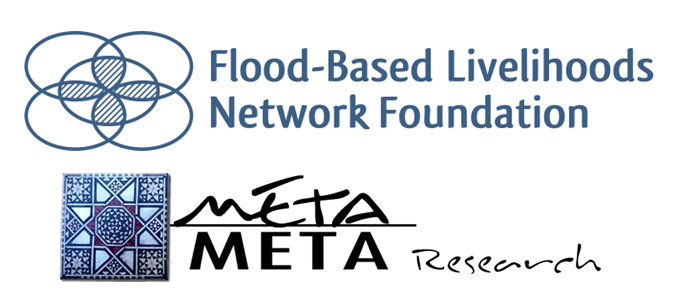
FBLN Pakistan
- Home
- Flood-Based Livelihoods Network
- FBLN Pakistan
Characteristics of FBL in the country and the geographical scope
With about 700.000 hectares, Pakistan is the country with the highest amount of land that can be brought under spate irrigation through the diversion of seasonal floods from hill torrents. Flood-based farming is practiced in all provinces of Pakistan, but particularly on the western (dry) side of the Indus River, which is technically out of command from this perennial water source. These regions include Dera Ismail Khan, Tank and Karaka in Khyber Pakhtunkhwa; Rajanpur and Dera Ghazi Khan in Punjab; the Kohistan region (Dadu, Jamshoro, Shahdad Kot and Malir districts) in Sindh; and almost the entire Balochistan province.
Main achievements in the past years
The FBLN Pakistan Chapter has reached to date several thousands of farmers, government officials, NGOs, professionals, students and donors. Awareness on spate irrigation’s best practices has been enhanced through presentations, publications and farmer exchange visits. Considerable efforts are made to increase investments in water management structures in particularly small and medium catchment areas. FBLN members and farmers from the four provinces frequently interact with each other through different medias, including a WhatsApp group, exchange visits and workshops.
The Pakistan Chapter engages local universities to conduct solution-oriented research, undertakes farmer training on field water management and agronomic practices by closely collaborating with agricultural extension offices, and gives much attention to farmer-to-farmer learning, seed exchange and provision of improved seed varieties.
Documentation
The initiative for the Pakistan Spate Irrigation Network was first discussed in January 2007. For the concept document, please click here. For the brochure, click here. At present the Pakistan Chapter counts 150 plus members. For registration please contact Karim Nawaz, Allah Bakhsh or the spate irrigation secretariat.
On October 4, 2013 the local Spate Irrigation Network Kyber Pashtoon Khawa Dera Ismail Khan Province in Pakistan has been established. For more information and people who are involved, click here. The signed Understanding and Agreement is also available.
Several activities are undertaken to strengthen the Pakistan Spate Irrigation Network, in particular the development of data base of spate practitioners, the preparation of information material – e.g. in the shape of a series of Practical Notes on spate irrigation in Pakistan and the preparation of a national workshop. This is done with support of the World Bank and the Royal Netherland Embassy. On 23-24 August 2010 a workshop is organized to discuss the programs of the Pakistan Spate Irrigation Network.
A 7 day training package on spate irrigation has also been prepared, bringing together experiences on spate irrigation in Pakistan and other countries. The CD with the modules can be ordered (free of charge) through info@spate-irrigation.org. You can also download the Training Modules. The training materials will be updated and made available as curriculum material. The library section of this site contains a large number of grey material documents and photos on spate irrigation in Pakistan, for instance scanned documents from the late 19th century and the early 20th century on spate irrigation and water rights in Pakistan. To view one of them, click here.
Several documents have been specially prepared by the Pakistan Chapter. You can find them in the spate notes. They also prepared two Powerpoint presentations:
- Shrubs in Spate Irrigated Areas in Pakistan
- Trees in Spate Irrigated Areas in Pakistan
- News letter #1 (February 2014)
- News letter #2 (January 2015)
- News letter #3 (June 2016)
- Guide Book on Spate Irrigation in Pakistan
Also a popular book on Spate Irrigation, The Dry Side of the Indus, written by Rina Saeed Khan, Karim Nawaz and Frank van Steenbergen, is published by Vanguard.
For an advocacy statement on spate irrigation, prepared at the initiative meeting of the Spate Irrigation Network, please click here.
Read also further in the Article in Dawn August 2007: part 1, part 2 and part 3.
For more information on the background of Spate Irrigation in Pakistan, please read Overview Paper 1: The Potential for the Development of Spate Irrigation Systems in Pakistan.
Other interesting documents are:
Pamphlet on the Strip cropping for Moisture Conservation
Water Distribution Agreement Narri Balochistan – Translation from Kalat State Document
Press Conference of Kachi Canal Farmers
Decision on Allocation of Additional Water for Mithri Weir Balochistan
History and Revenue Collection Procedure at Bhag Narri Balochistan
Some more information: Spate Project and Further Potential and Sanghar Spate Irrigation Surplus Water
